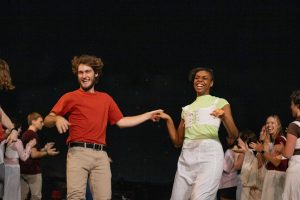The Bach Festival Society of Winter Park concluded its celebratory season on Saturday evening with Mendelssohn’s Elijah, premiered in 1846. The biblical story of the prophet who is taken to heaven in a chariot of fire provides exquisite imagery for Mendelssohn’s complex choral forces. The Bach Festival choir, orchestra, and soloists, under the direction of John V. Sinclair, rendered the score with elegance and sensibility.
Baritone Richard Zeller performed the titular role of the oratorio with soulful expression. His deep tone was projected with force – it filled Rollins College’s Knowles Memorial Chapel – and with emotional response to the libretto. In addition to the solo sections, the work features several vocal combinations for all four soloists; Zeller’s ‘Draw near, all ye people; come to me!’ recitative and air was particularly poignant and a highlight of the performance.
Rebecca Ringle, mezzo-soprano; Mary Wilson, soprano; and Robert Bracey, tenor, were the other three soloists. Their respective arias spotlighted praiseworthy vocal ranges; Ringle’s captivating tone, especially in the lower register, elevated her solo parts with delight.
At two and a half hours (including intermission), the performance was an intellectual workout for Sinclair, chorus and ensemble. The conductor put down his baton for some of the quieter moments. Throughout, he kept a steady beat, but always subservient to the highly emotive text, and, of course, the music that brings it to life.
The composer’s choral writing spins wonderful countermelodies from the different voice groups. The antiphonal writing creates overlap between the voices, wonderfully accomplished by the choir. An effective contrast, the chorus would ‘come together’ in unison, following a contrapuntal section; the resulting homophony created an assertive declamation. The most rampant choral writing included the ‘The fire descends from heaven! The flames consume his offering!’ section, toward the end of Part I. Here was the Bach Festival choir in all its raw resplendence; the section, a highlight of the performance, rivaled previous accomplishments of the organization’s 2014 – 2015 season, such as the recent performance Brahms’ German Requiem.
A few remarkable details included passages for octet voices, and an angelic offstage youth choir in Part II. The instrumental forces did not fail to impress, with particularly expressive performances by the lower strings in the quieter sections.
The 2015 – 2016 season will include music Dvorak’s New World Symphony, Beethoven’s Ninth, Rossini’s Stabat Mater, and Bach’s St. Matthew Passion, among others. With this season’s accomplishments, the new programming promises to impress.







Be First to Comment